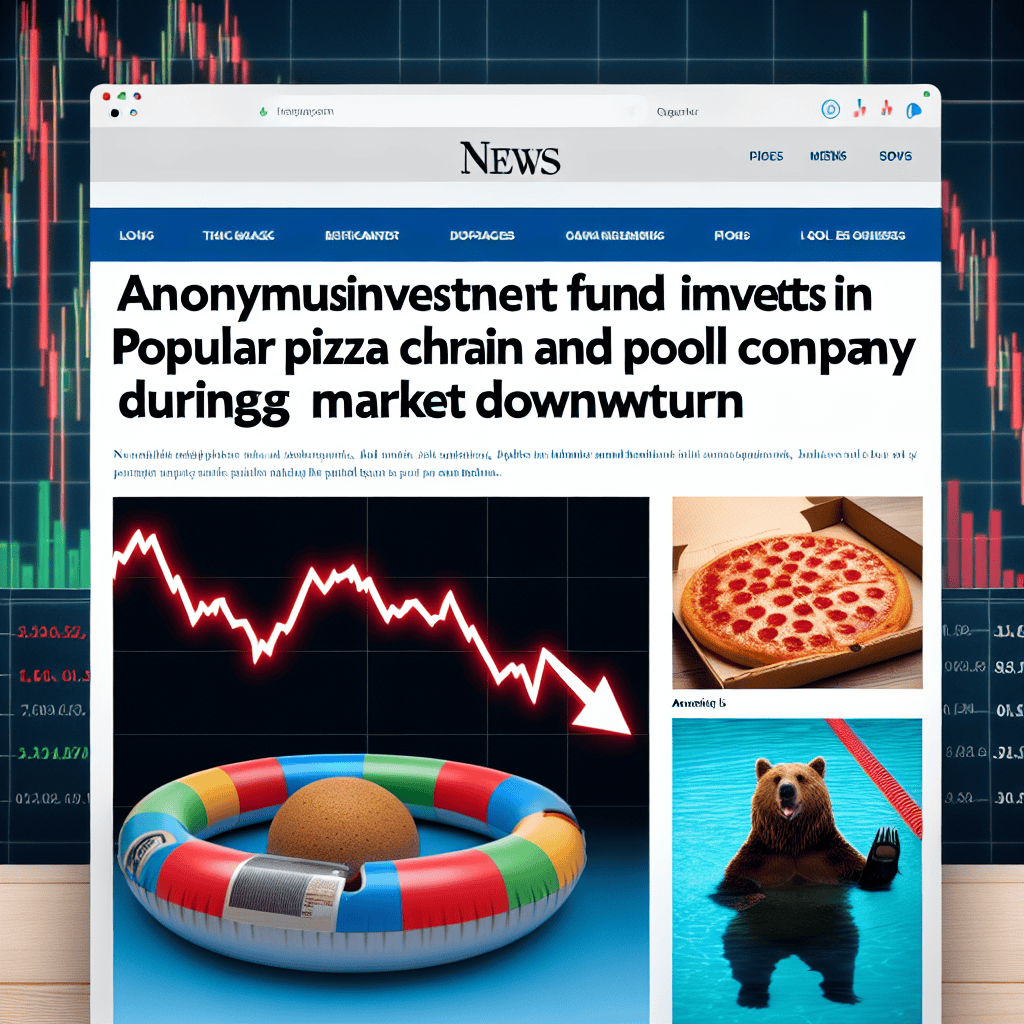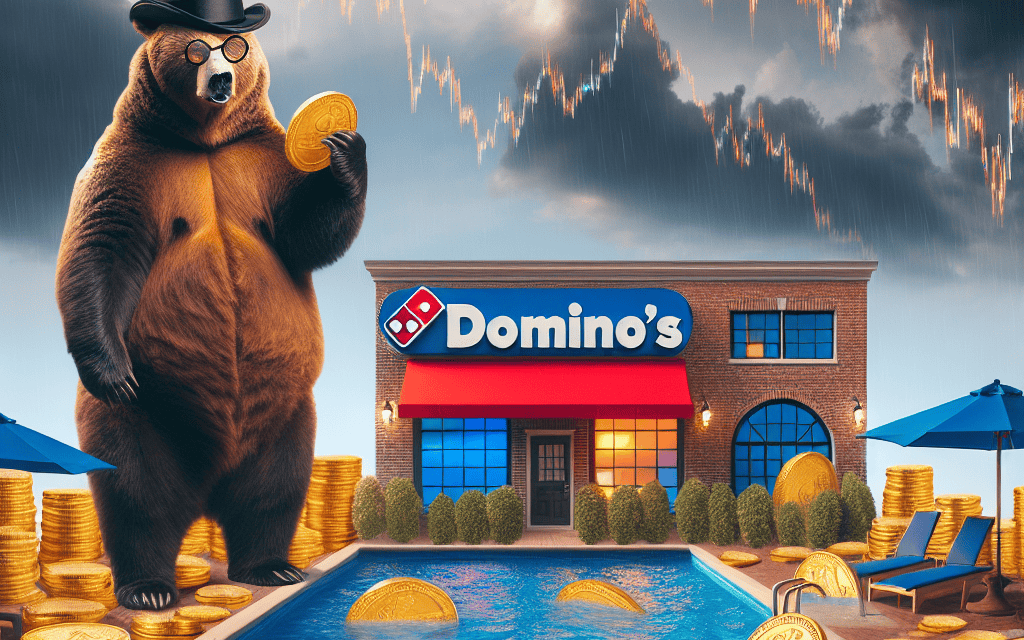“Slice and Dive: Berkshire Bets Big on Pizza and Pools Amid Market Waves”
Introduction
In a strategic move amid a challenging market environment, Berkshire Hathaway has expanded its investment portfolio by acquiring significant stakes in Domino’s Pizza and Pool Corporation. This decision underscores Berkshire’s confidence in the resilience and growth potential of these companies, even as economic uncertainties loom. Domino’s Pizza, a global leader in the pizza delivery industry, has demonstrated robust performance through its innovative digital platforms and efficient supply chain management. Meanwhile, Pool Corporation, the world’s largest wholesale distributor of swimming pool supplies and equipment, continues to capitalize on the growing demand for outdoor leisure activities. By investing in these sectors, Berkshire Hathaway aims to leverage the enduring consumer demand for affordable dining options and home-based recreational activities, positioning itself for long-term gains despite the current market downturn.
Berkshire’s Strategic Move: Investing in Domino’s Pizza Amid Economic Uncertainty
In a strategic maneuver that has captured the attention of investors and market analysts alike, Berkshire Hathaway has made a significant investment in Domino’s Pizza, a move that underscores the conglomerate’s confidence in the resilience of consumer-focused businesses even amid economic uncertainty. This decision comes at a time when the global economy is grappling with a downturn, characterized by fluctuating markets and widespread financial instability. By channeling resources into Domino’s Pizza, Berkshire Hathaway is not only diversifying its portfolio but also reinforcing its long-standing strategy of investing in companies with strong brand recognition and consistent demand.
The choice to invest in Domino’s Pizza is particularly noteworthy given the current economic climate. As consumers tighten their belts and prioritize essential spending, the food industry, especially fast food and delivery services, has demonstrated remarkable resilience. Domino’s, with its robust delivery infrastructure and widespread global presence, is well-positioned to capitalize on this trend. The company’s ability to adapt to changing consumer preferences, coupled with its innovative use of technology to streamline operations and enhance customer experience, makes it an attractive investment for Berkshire Hathaway.
Moreover, this investment aligns with Berkshire’s historical approach of seeking out companies with a proven track record of profitability and growth potential. Domino’s Pizza, with its consistent financial performance and strategic expansion plans, fits this criterion perfectly. The company’s focus on digital transformation, including its user-friendly app and efficient online ordering system, has further solidified its market position, making it a formidable player in the fast-food industry. This digital edge not only enhances customer convenience but also drives operational efficiency, factors that are crucial in maintaining competitiveness in a challenging economic environment.
In addition to Domino’s Pizza, Berkshire Hathaway has also shown interest in the leisure sector by investing in pool companies. This move reflects a broader strategy to tap into lifestyle and recreational markets, which have seen a surge in demand as people seek solace and entertainment at home. The pandemic-induced shift towards home-centric activities has led to increased spending on home improvement and leisure products, including pools. By investing in this sector, Berkshire is positioning itself to benefit from the sustained interest in home-based recreation, a trend that is likely to persist even as the world gradually returns to normalcy.
The decision to invest in both Domino’s Pizza and the pool industry highlights Berkshire Hathaway’s adeptness at identifying opportunities in diverse sectors, even during periods of economic uncertainty. This strategic diversification not only mitigates risk but also ensures a steady stream of revenue from multiple sources. Furthermore, it underscores the conglomerate’s commitment to long-term growth, a principle that has been the cornerstone of its investment philosophy.
In conclusion, Berkshire Hathaway’s investment in Domino’s Pizza and the pool industry is a testament to its strategic foresight and adaptability in navigating complex market dynamics. By focusing on sectors with inherent resilience and growth potential, the conglomerate is reinforcing its position as a leader in the investment landscape. As the global economy continues to face challenges, Berkshire’s strategic moves serve as a reminder of the importance of prudent investment choices and the value of maintaining a diversified portfolio.
Analyzing Berkshire’s Investment in Pool Corporation During Market Volatility
In the midst of market volatility, Berkshire Hathaway’s strategic investment decisions continue to capture the attention of financial analysts and investors alike. Recently, the conglomerate made headlines with its investment in Domino’s Pizza and Pool Corporation, a move that underscores its adeptness at navigating uncertain economic landscapes. While the investment in Domino’s Pizza aligns with Berkshire’s historical preference for consumer-centric businesses, the decision to invest in Pool Corporation warrants a closer examination, particularly given the current market conditions.
Pool Corporation, a leading distributor of swimming pool supplies, equipment, and related leisure products, may initially seem like an unconventional choice for Berkshire. However, a deeper analysis reveals the rationale behind this investment. During periods of market volatility, consumer behavior often shifts towards home-centric activities, as individuals seek solace and recreation within their own spaces. This trend has been further amplified by the global pandemic, which has heightened the demand for home improvement and leisure products. Consequently, Pool Corporation stands to benefit from this sustained interest in home-based leisure activities, making it an attractive investment opportunity.
Moreover, Pool Corporation’s robust business model and market position provide a solid foundation for long-term growth. The company boasts an extensive distribution network and a diverse product portfolio, catering to both residential and commercial customers. This diversification not only mitigates risks associated with market fluctuations but also positions Pool Corporation to capitalize on emerging trends in the leisure and wellness sectors. Additionally, the company’s commitment to innovation and customer service enhances its competitive edge, ensuring its resilience in the face of economic uncertainties.
Transitioning to the financial aspects, Pool Corporation’s consistent revenue growth and strong cash flow generation further justify Berkshire’s investment decision. The company’s ability to maintain profitability even during challenging economic periods speaks to its operational efficiency and strategic foresight. Furthermore, Pool Corporation’s prudent capital allocation and disciplined approach to mergers and acquisitions have enabled it to expand its market share and enhance shareholder value. These financial strengths align with Berkshire’s investment philosophy, which prioritizes companies with sustainable competitive advantages and sound financial management.
In light of these considerations, Berkshire’s investment in Pool Corporation can be seen as a calculated move to leverage market volatility to its advantage. By investing in a company that is well-positioned to thrive amidst changing consumer preferences and economic conditions, Berkshire demonstrates its commitment to long-term value creation. This strategic decision not only reinforces Berkshire’s reputation as a savvy investor but also highlights its ability to identify opportunities in sectors that may not be immediately apparent to others.
In conclusion, Berkshire Hathaway’s investment in Pool Corporation during a period of market volatility exemplifies its strategic acumen and forward-thinking approach. By recognizing the potential of home-centric leisure activities and aligning with a company that exhibits strong financial performance and market leadership, Berkshire underscores its commitment to sustainable growth and value creation. As market conditions continue to evolve, this investment serves as a testament to Berkshire’s enduring ability to navigate uncertainty and capitalize on emerging opportunities, reinforcing its status as a formidable force in the investment landscape.
How Domino’s Pizza Fits into Berkshire’s Long-Term Investment Strategy
Berkshire Hathaway, the multinational conglomerate led by the legendary investor Warren Buffett, has long been known for its strategic investments in companies with strong fundamentals and enduring competitive advantages. Recently, Berkshire’s decision to invest in Domino’s Pizza has raised eyebrows, particularly given the current market downturn. However, a closer examination reveals that this move aligns well with Berkshire’s long-term investment strategy, which focuses on acquiring stakes in businesses with robust growth potential, resilient business models, and the ability to generate consistent cash flows.
Domino’s Pizza, a global leader in the pizza delivery industry, presents a compelling case for investment, even amidst economic uncertainty. The company’s innovative approach to technology and logistics has set it apart from competitors, enabling it to maintain a strong market position. By leveraging digital platforms and data analytics, Domino’s has optimized its delivery operations, ensuring timely service and customer satisfaction. This technological edge not only enhances operational efficiency but also strengthens customer loyalty, a key factor in sustaining long-term growth.
Moreover, Domino’s has demonstrated remarkable adaptability in response to changing consumer preferences and market dynamics. The company’s ability to pivot its business model, such as expanding its menu offerings and enhancing its digital ordering capabilities, has allowed it to capture a broader customer base. This adaptability is crucial in an ever-evolving market landscape, where consumer demands and technological advancements continue to shape the competitive environment. By investing in a company that exhibits such flexibility, Berkshire is positioning itself to benefit from Domino’s sustained growth trajectory.
In addition to its operational strengths, Domino’s financial performance underscores its attractiveness as an investment. The company has consistently delivered strong revenue growth and profitability, driven by its efficient cost management and strategic expansion initiatives. Its global footprint, with a presence in numerous international markets, provides a diversified revenue stream that mitigates risks associated with economic fluctuations in any single region. This financial resilience aligns with Berkshire’s preference for companies that can weather economic downturns while continuing to generate shareholder value.
Furthermore, Domino’s commitment to innovation and sustainability resonates with Berkshire’s investment philosophy. The company’s efforts to reduce its environmental impact, such as implementing eco-friendly packaging and exploring alternative energy sources, reflect a forward-thinking approach that aligns with the growing emphasis on corporate responsibility. By investing in a company that prioritizes sustainability, Berkshire is not only supporting ethical business practices but also tapping into the increasing consumer demand for environmentally conscious brands.
While some may question the timing of this investment during a market downturn, it is important to recognize that Berkshire’s strategy often involves capitalizing on opportunities when valuations are attractive. The current economic climate, characterized by market volatility and uncertainty, presents a unique opportunity for Berkshire to acquire stakes in high-quality companies at favorable prices. By investing in Domino’s Pizza, Berkshire is adhering to its long-standing principle of buying into businesses with strong fundamentals and growth potential, regardless of short-term market fluctuations.
In conclusion, Berkshire Hathaway’s investment in Domino’s Pizza is a strategic move that aligns with its long-term investment strategy. By focusing on a company with a robust business model, strong financial performance, and a commitment to innovation and sustainability, Berkshire is positioning itself to benefit from Domino’s continued success. This investment not only reflects Berkshire’s confidence in Domino’s growth prospects but also underscores its ability to identify and capitalize on opportunities in challenging market conditions.
The Impact of Market Downturns on Berkshire’s Investment Decisions

During periods of market downturn, investment strategies often undergo significant scrutiny and adjustment. Berkshire Hathaway, under the astute leadership of Warren Buffett, has long been recognized for its strategic investment decisions, particularly during times of economic uncertainty. Recently, Berkshire’s decision to invest in Domino’s Pizza and Pool Corporation has garnered attention, highlighting its approach to navigating market fluctuations.
Market downturns typically induce a climate of caution among investors, prompting a reevaluation of portfolios and a search for resilient opportunities. In this context, Berkshire’s investment in Domino’s Pizza is particularly noteworthy. Domino’s, a global leader in the pizza delivery industry, has demonstrated remarkable resilience in the face of economic challenges. Its robust business model, characterized by a strong digital presence and an efficient supply chain, has enabled it to maintain steady growth even during economic slowdowns. By investing in Domino’s, Berkshire is capitalizing on the company’s ability to adapt to changing consumer behaviors, particularly the increasing demand for convenient and affordable dining options.
Moreover, the decision to invest in Pool Corporation further underscores Berkshire’s strategic acumen. Pool Corporation, a leading distributor of swimming pool supplies and related products, has shown consistent performance, driven by the growing trend of home improvement and outdoor leisure activities. During economic downturns, consumers often prioritize enhancing their living spaces, leading to increased demand for products that improve home comfort and value. Berkshire’s investment in Pool Corporation reflects a keen understanding of these consumer trends and the potential for sustained growth in the home improvement sector.
Transitioning from these specific investments, it is essential to consider the broader implications of Berkshire’s strategy during market downturns. Historically, Berkshire Hathaway has thrived by identifying undervalued companies with strong fundamentals and long-term growth potential. This approach is particularly effective during economic downturns when market volatility can create opportunities to acquire quality assets at attractive valuations. By focusing on companies with resilient business models and the ability to weather economic storms, Berkshire mitigates risk while positioning itself for future gains.
Furthermore, Berkshire’s investment decisions during downturns are often guided by a long-term perspective. Rather than succumbing to short-term market pressures, the company emphasizes the importance of patience and strategic foresight. This philosophy is evident in its recent investments, which align with broader trends in consumer behavior and industry dynamics. By maintaining a focus on long-term value creation, Berkshire not only navigates current market challenges but also lays the groundwork for sustained success in the future.
In conclusion, Berkshire Hathaway’s investments in Domino’s Pizza and Pool Corporation during a market downturn exemplify its strategic approach to investment decision-making. By identifying companies with resilient business models and aligning with long-term consumer trends, Berkshire effectively navigates economic uncertainties while positioning itself for future growth. This strategy underscores the importance of a disciplined, long-term perspective in investment decisions, particularly during periods of market volatility. As Berkshire continues to adapt to changing market conditions, its investment choices serve as a testament to the enduring principles of value investing and strategic foresight.
Warren Buffett’s Confidence in Consumer Staples: A Look at Domino’s and Pool
In the midst of a market downturn, Berkshire Hathaway, under the astute leadership of Warren Buffett, has made strategic investments in Domino’s Pizza and Pool Corporation, signaling a robust confidence in the enduring appeal of consumer staples. This move, while surprising to some, aligns with Buffett’s long-standing investment philosophy that emphasizes the importance of businesses with strong brand recognition and consistent demand. As the global economy faces uncertainties, these investments underscore a belief in the resilience of consumer staples, which often provide stability in turbulent times.
Domino’s Pizza, a global leader in the pizza delivery industry, has consistently demonstrated its ability to adapt to changing consumer preferences and technological advancements. The company’s innovative approach to digital ordering and delivery logistics has set it apart from competitors, ensuring a steady stream of revenue even during economic slowdowns. By investing in Domino’s, Berkshire Hathaway is betting on the continued growth of the fast-food sector, which has historically shown resilience during economic downturns. The convenience and affordability of fast food make it an attractive option for consumers tightening their budgets, thus providing a buffer against economic volatility.
Similarly, Pool Corporation, the world’s largest wholesale distributor of swimming pool supplies, equipment, and related leisure products, represents another facet of consumer staples that Berkshire finds appealing. The investment in Pool Corporation highlights a recognition of the growing trend towards home improvement and outdoor leisure activities, which gained significant momentum during the pandemic. As more individuals invest in enhancing their home environments, the demand for pool-related products is expected to remain strong. This trend is further bolstered by the increasing popularity of staycations, where families opt to enjoy leisure activities at home rather than travel, thereby sustaining the demand for Pool Corporation’s offerings.
Moreover, these investments reflect a broader strategy of capitalizing on businesses with strong fundamentals and a proven track record of profitability. Both Domino’s and Pool Corporation have demonstrated consistent financial performance, characterized by steady revenue growth and robust profit margins. This financial stability is particularly attractive in a market downturn, where investors seek refuge in companies with the ability to weather economic storms. By focusing on businesses with a solid foundation, Berkshire Hathaway mitigates risk while positioning itself for long-term gains.
In addition to financial stability, the investments in Domino’s and Pool Corporation also align with Buffett’s preference for companies with a competitive edge. Domino’s, with its extensive global presence and innovative delivery model, enjoys a significant competitive advantage in the fast-food industry. Similarly, Pool Corporation’s vast distribution network and comprehensive product offerings provide it with a dominant position in the pool supply market. These competitive advantages not only ensure continued market leadership but also create barriers to entry for potential competitors, further solidifying the investment’s potential for success.
In conclusion, Berkshire Hathaway’s investments in Domino’s Pizza and Pool Corporation during a market downturn reflect a strategic focus on consumer staples that offer stability, growth potential, and competitive advantages. By leveraging the enduring appeal of these sectors, Warren Buffett demonstrates a commitment to investing in businesses that not only withstand economic challenges but also thrive in the long run. As the global economy navigates uncertain waters, these investments serve as a testament to the enduring value of consumer staples in an ever-changing market landscape.
Diversification Tactics: Berkshire’s Approach with Domino’s and Pool Investments
In the ever-evolving landscape of global finance, Berkshire Hathaway’s strategic investment decisions continue to capture the attention of market analysts and investors alike. Recently, the conglomerate made headlines with its decision to invest in Domino’s Pizza and Pool Corporation, a move that underscores its commitment to diversification, even amidst a market downturn. This strategic pivot not only highlights Berkshire’s adaptability but also its keen eye for identifying resilient sectors that promise long-term growth.
Berkshire Hathaway, under the astute leadership of Warren Buffett, has long been celebrated for its diversified investment portfolio. The decision to invest in Domino’s Pizza is a testament to the company’s ability to recognize the enduring appeal of the food and beverage industry. Domino’s, a global leader in pizza delivery and carryout, has demonstrated remarkable resilience, even during economic slowdowns. Its robust digital infrastructure and innovative marketing strategies have enabled it to maintain a strong market presence, making it an attractive investment for Berkshire. By capitalizing on Domino’s proven track record of growth and adaptability, Berkshire is positioning itself to benefit from the continued demand for convenient dining options.
Simultaneously, Berkshire’s investment in Pool Corporation reflects its strategic foresight in identifying sectors with promising growth potential. Pool Corporation, a leading distributor of swimming pool supplies and related products, has experienced significant growth driven by the increasing popularity of home improvement projects and outdoor leisure activities. As more individuals seek to enhance their living spaces, the demand for pool-related products has surged, presenting a lucrative opportunity for investors. Berkshire’s investment in Pool Corporation is indicative of its confidence in the sustained growth of the home improvement sector, particularly as consumers continue to prioritize home-based leisure activities.
Moreover, these investments align with Berkshire’s broader strategy of seeking value in diverse industries. By investing in both Domino’s Pizza and Pool Corporation, Berkshire is effectively hedging its bets across different sectors, thereby mitigating risks associated with market volatility. This approach not only enhances the stability of its portfolio but also ensures that the company remains well-positioned to capitalize on emerging trends across various industries.
Furthermore, Berkshire’s investment decisions are informed by a comprehensive analysis of market dynamics and consumer behavior. The choice to invest in Domino’s and Pool Corporation is underpinned by a recognition of shifting consumer preferences towards convenience and home-centric lifestyles. As the global economy continues to navigate uncertainties, these sectors are poised to benefit from sustained consumer demand, making them attractive investment opportunities.
In conclusion, Berkshire Hathaway’s recent investments in Domino’s Pizza and Pool Corporation exemplify its strategic approach to diversification during a market downturn. By identifying resilient sectors with strong growth potential, Berkshire is reinforcing its commitment to long-term value creation. These investments not only reflect the company’s adaptability but also its ability to navigate complex market conditions with precision. As Berkshire continues to diversify its portfolio, its strategic investments serve as a testament to its enduring legacy of prudent financial management and visionary leadership. Through these calculated moves, Berkshire Hathaway remains a formidable force in the world of finance, consistently setting benchmarks for strategic investment practices.
Market Downturn Opportunities: Berkshire’s Bet on Domino’s Pizza and Pool Corporation
In the midst of a market downturn, Berkshire Hathaway, the multinational conglomerate led by the astute investor Warren Buffett, has once again demonstrated its strategic prowess by investing in Domino’s Pizza and Pool Corporation. This move, while surprising to some, aligns with Berkshire’s long-standing philosophy of seeking value in times of economic uncertainty. As markets fluctuate and investors grapple with volatility, Berkshire’s decision to allocate capital to these companies underscores its confidence in their long-term potential and resilience.
Domino’s Pizza, a global leader in the pizza delivery industry, has consistently shown its ability to adapt and thrive, even in challenging economic climates. The company’s robust digital infrastructure and innovative delivery solutions have positioned it as a formidable player in the fast-food sector. By investing in Domino’s, Berkshire is betting on the continued growth of the food delivery market, which has seen a significant surge in demand due to changing consumer preferences and the ongoing impact of the COVID-19 pandemic. Furthermore, Domino’s strong brand recognition and loyal customer base provide a solid foundation for future expansion, making it an attractive investment opportunity for Berkshire.
Similarly, Pool Corporation, the world’s largest wholesale distributor of swimming pool supplies, equipment, and related leisure products, presents a compelling case for investment. The company has benefited from a pandemic-induced boom in home improvement and outdoor leisure activities, as more people seek to enhance their living spaces. This trend has led to increased demand for pool installations and maintenance, driving Pool Corporation’s growth. Berkshire’s investment in Pool Corporation reflects its belief in the sustained popularity of home-centric lifestyles and the potential for continued expansion in the leisure sector.
Transitioning from the specifics of these investments, it is essential to consider the broader implications of Berkshire’s strategy during a market downturn. Historically, Buffett has advocated for a contrarian approach, emphasizing the importance of being “fearful when others are greedy and greedy when others are fearful.” By investing in companies with strong fundamentals and growth prospects, even when market sentiment is low, Berkshire aims to capitalize on undervalued opportunities that may yield substantial returns in the long run. This approach not only highlights Berkshire’s commitment to value investing but also reinforces its reputation as a patient and disciplined investor.
Moreover, Berkshire’s focus on Domino’s Pizza and Pool Corporation illustrates its confidence in sectors that are likely to remain resilient despite economic headwinds. The food delivery and home leisure industries have demonstrated their ability to weather downturns, driven by enduring consumer demand and evolving lifestyle trends. By targeting these sectors, Berkshire is positioning itself to benefit from both immediate market recovery and sustained growth over time.
In conclusion, Berkshire Hathaway’s investment in Domino’s Pizza and Pool Corporation during a market downturn exemplifies its strategic acumen and unwavering commitment to value investing. By identifying and capitalizing on opportunities in resilient sectors, Berkshire not only reinforces its investment philosophy but also sets the stage for potential long-term gains. As the market continues to navigate uncertainty, Berkshire’s calculated bets on these companies serve as a testament to its enduring belief in the power of strategic investment and the potential for growth even in challenging times.
Q&A
1. **What is Berkshire Hathaway?**
Berkshire Hathaway is a multinational conglomerate holding company led by Warren Buffett, known for its diverse range of investments and ownership in various industries.
2. **Why did Berkshire Hathaway invest in Domino’s Pizza?**
Berkshire Hathaway likely invested in Domino’s Pizza due to its strong brand presence, consistent financial performance, and potential for growth, even during economic downturns.
3. **What is the significance of investing during a market downturn?**
Investing during a market downturn can be strategic, as it allows investors to purchase stocks at lower prices, potentially leading to higher returns when the market recovers.
4. **How does Domino’s Pizza perform during economic downturns?**
Domino’s Pizza often performs well during economic downturns due to its affordable pricing, strong delivery network, and consumer preference for cost-effective dining options.
5. **What other company did Berkshire invest in alongside Domino’s Pizza?**
Berkshire Hathaway also invested in a pool company, which could refer to a business involved in swimming pool manufacturing, maintenance, or related services.
6. **Why might Berkshire invest in a pool company during a downturn?**
Investing in a pool company might be seen as a bet on the home improvement and leisure sectors, which can remain resilient as people invest in home-based entertainment and amenities.
7. **What is Warren Buffett’s investment strategy during downturns?**
Warren Buffett’s strategy often involves identifying undervalued companies with strong fundamentals and long-term growth potential, taking advantage of lower stock prices during downturns.
Conclusion
Berkshire Hathaway’s investment in Domino’s Pizza and Pool Corporation during a market downturn reflects a strategic move to capitalize on resilient consumer sectors. Domino’s, with its robust delivery model and strong brand presence, offers stability and growth potential in the fast-food industry. Similarly, Pool Corporation, a leader in the pool supply and equipment sector, benefits from consistent demand driven by residential leisure activities. By investing in these companies, Berkshire Hathaway demonstrates confidence in their ability to weather economic challenges and deliver long-term value, aligning with its strategy of focusing on fundamentally strong businesses with enduring consumer demand.




